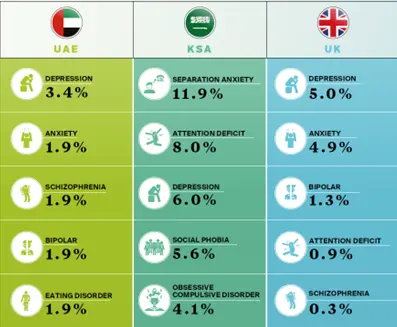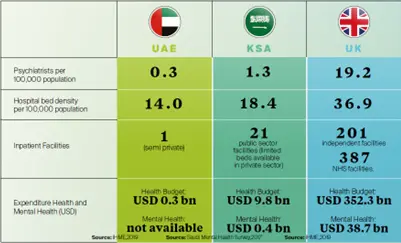PHOTO
UAE l KSA – The Middle East, particularly the UAE and Saudi Arabia, faces an urgent need for additional psychiatric beds to meet the growing demand for mental health services. According to Knight Frank MEA's Healthcare division's latest Mental Health Report, an investment budget of USD 4.3 billion is required to fulfil the demand for 16,301 psychiatric beds in the region.
The UAE's population is expected to reach nearly 11 million and Saudi Arabia's population is projected to reach 43 million by 2030. Both countries require additional inpatient beds for mental health to cater to the needs of their expanding populations, more specifically, the UAE needs 3,381 additional beds, while Saudi Arabia requires 12,920 beds to meet the density levels of countries with a developed mental health infrastructure.
The young demographic profile of both countries, coupled with societal changes and advancements, increases the risk of mental health conditions, especially among individuals aged 20-39. Moreover, by 2030, the region is expected to experience a threefold increase in people aged over 60, who often require such care.
Studies from the World Health Organization (WHO) and the NHS indicate a strong correlation between diabetes and depression, with diabetic patients being 2-3 times more likely to be diagnosed with depression. With 1 in 11 adults worldwide diagnosed with diabetes, there is a significant likelihood of high levels of depression among the adult population.
Mental Health Numbers - How the Middle East Stacks Up Against the UK




Despite the increasing demand for mental health services, there is a lack of inpatient facilities to meet the needs arising from outpatient facilities. In the UAE, there is only one dedicated mental health facility serving the entire population, while in Saudi Arabia, there are limited psychiatric clinics and inpatient facilities, primarily catering to Saudi nationals.
Dr Gireesh Kumar – Associate Partner, Strategy & Consultancy – Healthcare, MEA says: "Incidence rates of conditions such as anxiety and depression are higher in KSA and on par in the UAE when compared to the UK. However, in terms of infrastructure, KSA and UAE have a psychiatry bed density of 14.0 and 18.4 beds per 100,000 population, respectively, compared to 36.9 beds per 100,000 population in the UK. This highlights the disparity in the availability of mental health services and facilities in the region. To address the rising burden of mental health conditions, additional investment is required in the sector for both preventive and curative care."
Government initiatives in both countries aim to address the gaps in mental health care. The UAE’s 2030 Government Health Strategy identifies mental health care as less developed in comparison to other health areas. The Dubai Health Authority (DHA) and Department of Health, Abu Dhabi (DOH) estimate a requirement of 177 acute inpatient beds and 639 acute overnight beds for mental health services. Similarly, MOH at KSA estimate a requirement of 915 psychiatric beds. This suggests an immediate requirement for investment in the sector to reduce the mortality and morbidity associated with MHDs.
Shehzad Jamal – Partner, Strategy & Consultancy, MEA says: "The UAE introduced mental health services in 1980, and today, mental health is a key performance indicator in the UAE National Agenda. In Saudi Arabia, the National Mental Health Policy was introduced in 2006, and providing effective care for people with mental health illnesses is a strategic objective of Vision 2030. These initiatives by the governments demonstrate their commitment to improving mental health care and ensuring better access to services for their populations."
Addressing the future of mental health in the UAE and Saudi Arabia necessitates a multifaceted approach. The challenges of affordability, stringent regulations, inadequate infrastructure, and stigma associated with mental illness must be met with proactive solutions.
Jamal continues: “Looking ahead, we need to make mental health services more accessible and affordable, streamline regulatory processes to ensure we have enough talent and resources, and invest in strong infrastructure. This includes investing in digital technology for mental health, which has become more popular since COVID-19. It's also crucial to fight the stigma around mental health so people can seek the help they need without fear or hesitation."
-Ends-
About Knight Frank:
Knight Frank LLP is the leading independent global property consultancy. Headquartered in London, the Knight Frank network has 487 offices across 53 territories and more than 20,000 people The Group advises clients ranging from individual owners and buyers to major developers, investors, and corporate tenants. For further information about the Firm, please visit www.knightfrank.com.
In the MENA region, we have strategically positioned offices in key countries such as the United Arab Emirates, Saudi Arabia, Bahrain, Qatar, and Egypt. For the past 13 years, we have been offering integrated residential and commercial real estate services, including transactional support, consultancy, and management.
Understanding the unique intricacies of local markets is at the core of what we do, we blend this understanding with our global resources to provide you with tailored solutions that meet your specific needs. At Knight Frank, excellence, innovation, and a genuine focus on our clients drive everything we do. We are not just consultants; we are trusted partners in property ready to support you on your real estate journey, no matter the scale of your endeavour.
For all Media and PR inquiries, please contact:
Roksar Kamal, PR and Communications Manager
Roksar.kamal@me.knightfrank.com
Let's connect socially - find us on LinkedIn, Instagram, and Twitter. For more information and to explore how we can be your partners in property, please visit our website at https://www.knightfrank.ae.




















